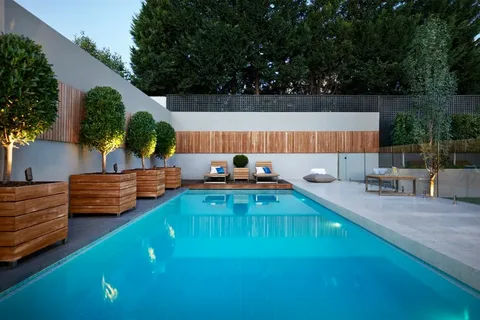When you’re considering installing a pool on your property, the options can feel overwhelming. A pool is more than just a water-filled hole in the ground; it’s an investment in your home’s aesthetic, your lifestyle, and your personal enjoyment. Choosing the right type of pool is essential, not just for the look and feel of your yard, but also for factors like maintenance, durability, and cost. A Pool Builder specializes in constructing different kinds of pools, each with its own set of advantages and considerations. This article explores the most popular pool types a Pool Builder can construct, helping you make an informed decision for your property.
Concrete Pools
Concrete pools are a classic choice and offer the highest level of customization in terms of shape, size, and depth. They are constructed by pouring concrete into a pre-dug hole, which is then finished with plaster or other materials like pebble or aggregate. This gives homeowners the flexibility to create any design they envision, from intricate curves to sharp angles. If you’re working with a skilled Pool Builder, a concrete pool can become a true masterpiece that reflects your personal style.
Advantages of Concrete Pools:
- Customization: Concrete pools are fully customizable in shape and size, so you can tailor them to your backyard’s specific layout and design.
- Durability: Concrete is one of the most durable materials available. Once the pool is installed by a professional Pool Builder, it can last for decades with proper care.
- Variety of Finishes: Concrete pools can be finished with a variety of materials, including plaster, pebble, or tile, allowing for different looks and textures.
Disadvantages of Concrete Pools:
- Cost: Concrete pools are typically more expensive than other pool types due to the extensive labor and materials required.
- Longer Installation Time: Building a concrete pool is a time-consuming process, taking several months to complete from start to finish.
- Higher Maintenance: Concrete pools require regular upkeep to prevent surface cracks and staining. They also need to be re-plastered every 10-15 years, which is an additional cost to consider when choosing a Pool Builder.
Fiberglass Pools
Fiberglass pools are pre-manufactured in a factory and delivered to your home, where they are installed into a hole that has already been excavated. These pools are molded in one piece, eliminating the need for construction on-site. Fiberglass pools are known for their smooth finish, which makes them more comfortable and easier to maintain. A Pool Builder can efficiently install these pools in a short amount of time, making them a popular option.
Advantages of Fiberglass Pools:
- Quick Installation: Since fiberglass pools are pre-formed, installation is much faster than concrete pools, often taking only a few weeks.
- Low Maintenance: The smooth surface of fiberglass pools makes them less likely to accumulate algae and debris. This means you’ll spend less time on cleaning and maintenance.
- Durability: Fiberglass is incredibly resistant to cracking, and these pools are less likely to be affected by ground movement than concrete pools.
- Energy Efficiency: The insulation properties of fiberglass help to maintain the water temperature, reducing heating costs.
Disadvantages of Fiberglass Pools:
- Limited Design Options: Because fiberglass pools are pre-molded, they are limited in terms of shapes and sizes. While they come in many standard designs, custom shapes are not as feasible as with concrete.
- Upfront Cost: Although the overall maintenance costs are lower, the upfront price of a fiberglass pool can be higher than vinyl liner pools, which is something to discuss with your Pool Builder.
Vinyl Liner Pools
Vinyl liner pools are constructed using a steel, polymer, or aluminum frame, which is then lined with a vinyl membrane. The liner is custom-made to fit the pool’s dimensions, and it gives the pool its color and texture. These pools are popular due to their lower initial cost and relatively easy installation process. A Pool Builder can help guide you in selecting the best vinyl liner options for your pool.
Advantages of Vinyl Liner Pools:
- Cost-Effective: Vinyl liner pools are typically the least expensive option when compared to concrete and fiberglass pools.
- Quick Installation: Like fiberglass pools, vinyl liner pools can be installed much faster than concrete pools, often in a matter of weeks.
- Customizable Design: Vinyl liners come in various colors, patterns, and textures, allowing homeowners to personalize the look of their pool.
- Smooth Surface: The smooth surface of the vinyl liner is easy to clean and resists algae buildup.
Disadvantages of Vinyl Liner Pools:
- Liner Replacement: The vinyl liner will need to be replaced every 7-15 years, depending on the quality and maintenance. This can be a costly expense over time.
- Less Durability: While vinyl liners are durable, they are prone to tearing, punctures, and fading over time, especially if the pool is improperly maintained.
- Not Ideal for Unique Shapes: Although vinyl liner pools can be customized, they are not as adaptable as concrete pools for truly unique shapes and designs.
Above-Ground Pools
Above-ground pools are an affordable and quick way to enjoy a pool without the extensive excavation and construction involved with in-ground options. They are supported by a metal frame and a pool liner, and they sit on the surface of the ground. These pools are typically round or oval in shape, though rectangular models are available. A Pool Builder can help you assess whether an above-ground pool is the right choice for your property.
Advantages of Above-Ground Pools:
- Affordable: Above-ground pools are much more affordable than in-ground options, making them an excellent choice for those on a budget.
- Quick Installation: Installation can often be completed within a few days, making them a great option for anyone looking for a temporary or fast solution.
- Portability: As the name suggests, these pools can be taken down and relocated if needed, providing more flexibility than in-ground pools.
Disadvantages of Above-Ground Pools:
- Limited Aesthetic Appeal: Above-ground pools are often considered less visually appealing than in-ground options. They can be bulky and might not blend as seamlessly into the landscape.
- Not Permanent: Since these pools are not permanent, they may not add as much value to your property as in-ground pools, something to consider when working with a Pool Builder.
Infinity Pools
Infinity pools, also known as vanishing edge or negative-edge pools, are designed to give the illusion that the water extends to the horizon or disappears into the landscape. These pools are typically built in locations with breathtaking views, such as a cliffside or a waterfront property. A Pool Builder with experience in luxury pool designs can help you achieve the perfect infinity pool for your space.
Advantages of Infinity Pools:
- Stunning Visual Effect: The primary appeal of an infinity pool is its aesthetic, offering a luxurious and visually captivating effect.
- Enhanced Property Value: Due to their unique design and luxurious feel, infinity pools can add significant value to your property.
Disadvantages of Infinity Pools:
- High Cost: The construction of an infinity pool can be quite expensive, due to the specialized design and engineering involved.
- Maintenance: The constant flow of water over the edge can require more maintenance to keep the system functioning properly.
Plunge Pools
Plunge pools are small, shallow pools designed for relaxation and cooling off, rather than for swimming laps. They are typically installed in smaller backyards or areas where space is limited. These pools can be made of concrete, fiberglass, or vinyl, depending on the homeowner’s preference. A Pool Builder can design a plunge pool to perfectly fit a compact area while offering a refreshing oasis.
Advantages of Plunge Pools:
- Space-Saving: Plunge pools are ideal for small yards or for homeowners who don’t need a full-sized swimming pool.
- Low Maintenance: Due to their size, plunge pools require less maintenance and fewer chemicals than larger pools.
Disadvantages of Plunge Pools:
- Limited Use: Plunge pools are not designed for swimming, so they may not be ideal for those who want to swim laps or engage in water activities.
- Cost: While they are smaller, plunge pools can still be costly to install, especially if they require custom designs or advanced features, so it’s important to consult with your Pool Builder on costs.
Hot Tubs and Spas
Hot tubs and spas are smaller, self-contained pools designed for relaxation and hydrotherapy. These pools are equipped with jets that provide massaging action, making them popular for both physical therapy and relaxation. A Pool Builder can integrate a spa into your pool project to enhance your outdoor experience.
Advantages of Hot Tubs and Spas:
- Relaxation and Therapy: Hot tubs provide a therapeutic experience with their heated water and massaging jets, which can help with muscle relaxation and stress relief.
- Compact Design: Hot tubs take up much less space than full-sized pools, making them perfect for smaller properties or as an addition to an existing pool.
Disadvantages of Hot Tubs and Spas:
- Limited Use: Hot tubs and spas are not meant for swimming and are limited to relaxation and hydrotherapy purposes.
- Maintenance: Like any pool, hot tubs require regular cleaning and maintenance to ensure the water remains safe and clean.
Conclusion
Choosing the right pool for your home is a big decision, and there are several factors to consider, such as cost, maintenance, design, and your personal preferences. Whether you opt for a concrete, fiberglass, vinyl liner, above-ground, or a more luxurious infinity pool, each type offers unique benefits and features. By working with an experienced Pool Builder, you can select the perfect pool that meets both your aesthetic desires and practical needs. A Pool Builder will guide you through the process, ensuring that your pool installation goes smoothly, from design to completion.
FAQs
Q: Which type of pool is the cheapest to install?
A: Above-ground pools are generally the most affordable option, followed by vinyl liner pools.
Q: Which pool is the most durable?
A: Concrete pools are the most durable when properly maintained, though fiberglass pools are also highly resistant to cracking and wear.
Q: How long does it take to install a pool?
A: Installation time can vary. Above-ground pools can be installed in a matter of days, while concrete pools can take several months.
Q: What is the best pool for small yards?
A: Plunge pools are an excellent choice for small yards, as they take up less space and are perfect for relaxing.
Q: How often do pool liners need to be replaced?
A: Vinyl pool liners typically need to be replaced every 7-15 years, depending on the quality of the liner and maintenance.


